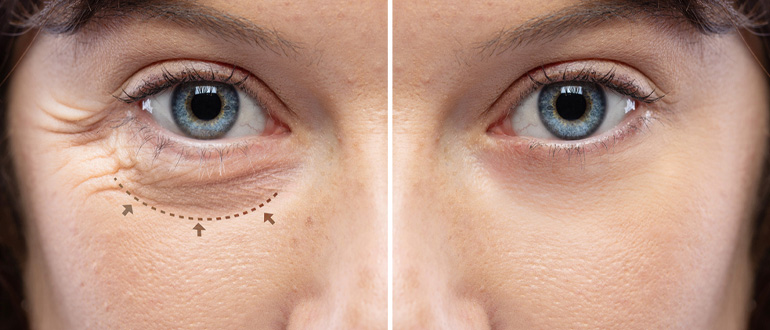What is eyelid surgery or blepharoplasty?
Eyelid surgery or Blepharoplasty is a surgical procedure that treats excess skin and orbital fat around the eyes. Whether that is a congenital problem (born with) or caused by aging process of the skin. That gives a sagging and baggy look to the eyelids due to the lack of elasticity in the skin, and fat accumulation under the eye.
This procedure is usually used for cosmetic reason. But it is also used for functional reasons to improve sight in older people whose sagging upper eyelid affects their vision. In both cases eyelid surgery plays an important role in face rejuvenation and gives a self-confidence to the patient.
Our clinic in Istanbul Turkey is known world wide with its best surgeons and thousands of operations each year.
How is eyelid surgery performed?
Patient undergoing eyelid surgery will have a general anesthesia, in some cases a local anesthesia after a sedation.
The surgeon will make incisions along with the natural skin lines (folds) of the upper and lower eyelids. Then, remove excess tissues (skin and fat), tighten the muscles then pull back the skin to close the incision with tiny stitches.
Using the natural eyelid folds to cut the incision along with allows to hide the marks. So at the end of the recovery time there will be no apparent scars.
After eyelid operation:
After the surgery you can go back home at the same day, but you better have someone to stay with you the first night. You will be given painkiller and antibiotics (to be used just in case of pain).
In the first days it is recommended to use cold packs every hour for 10 minutes to reduce swelling and bruising. The stitches will be removed after 5 to 7 days after the surgery by the surgeon. The complete healing process may take few weeks during which you should not wear eye make up and contact lenses.
Are you a good candidate for eyelid surgery?
You can consider having a blepharoplasty surgery if you have:
- A good health status, and no health issues that can affect the healing process
- Baggy or droopy upper eyelids.
- excess skin on the upper eyelids that interferes with your vision.
- excess skin on the lower eyelids.
- Fat bags under your eyes.
Note : Blepharoplasty surgery does not treat dark circles under the eyes nor facial wrinkles.
Complications:
The most common complication after eyelid surgery is the dry eyes. And that is due to the difficulty in closing the eyes in the first few days after the operation. For that the doctor may prescribe eye drops, and gentle massage of the eyelids after the first week.
